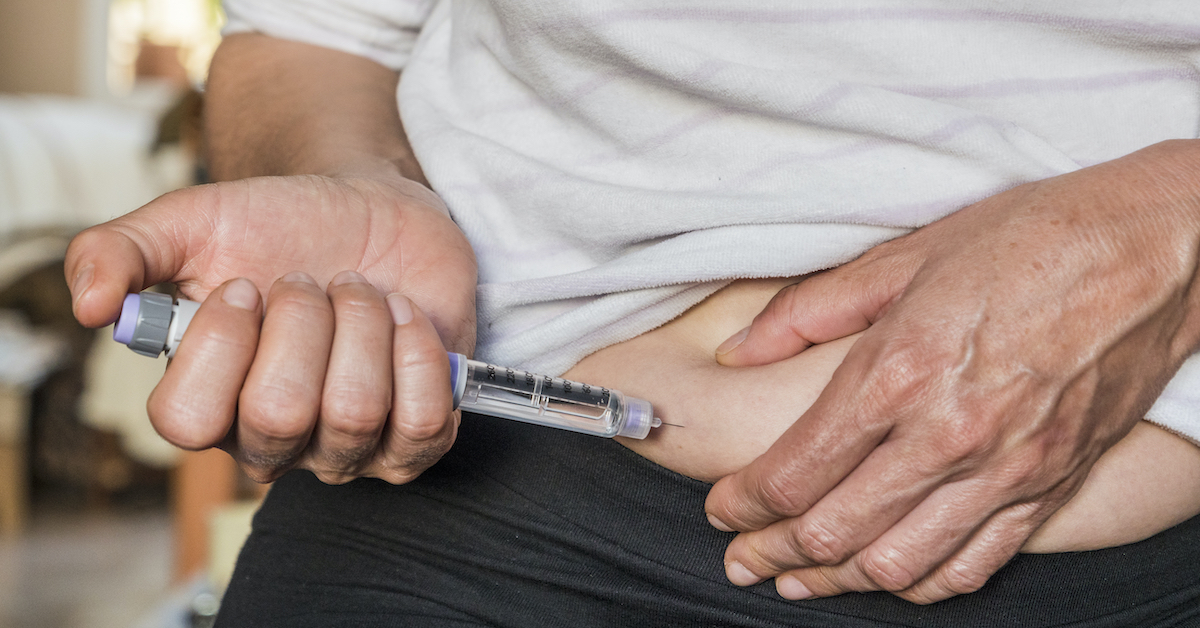
Woman injecting insulin into her abdomen. (Photo by: SCIENCE PHOTO LIBRARY via AP Images)
California sued the nation’s top drug companies, including Eli Lilly, Novo Nordisk, and Sanofi, to hold them liable for their alleged complicity in illegally manipulating the price of insulin.
On Thursday, California Attorney General Rob Bonta (D) announced his intention to file a civil lawsuit in Los Angeles County Superior Court accusing those major players, and others, of acting as an “oligopoly” for overcharging vulnerable consumers for the life-saving drug.
Bonta’s lawsuit charges that despite insulin being a “century-old, life-sustaining drug,” the price for it has “[i]nexplicably… risen several hundred percent over the last two decades.” The complaint says that the outrageous prices “disproportionately harms low-income communities who must choose between paying for insulin or everyday necessities, such as housing and food,” and that the harm is compounded in that minority and low-income communities are not only more likely to be uninsured or underinsured — but are also more likely to be diagnosed with diabetes and therefore require insulin.
The defendants in the lawsuit are the three primary insulin manufacturers for the U.S. supply (Eli Lilly, Novo Nordisk, and Sanofi), as well as three primary prescription drug program managers (CVS Caremark, Express Scripts, and OptumRx). The complaint alleges that the pharmaceutical giants’ scheme is illegal and has two main components. First, it says, the manufacturing companies work “in lockstep with each other” to artificially inflate the price of insulin. Then, the prescription drug manager companies get “significant secret rebates” as kickbacks for promoting and prioritizing the drugs within their sphere of influence.
Calling the companies’ conduct “unconscionable,” the lawsuit raises claims of unfair business practices, fraud, and unjust enrichment under state law. Bonta seeks not only a court order to prevent the companies from continuing their practices, but also to compensate Californians for overpayments.
“No company is too big to skirt the law or too large to be held accountable,” Bonta said at a press conference announcing the lawsuit. “Big Pharma might negotiate drug prices, but as your attorney general, let me be unequivocally clear. On my watch, the health and the well-being of Californians is nonnegotiable.”
Bonta also called insulin pricing “not a partisan issue,” and said that attorneys general across the political spectrum agree that “the status quo is unacceptable and problematic and awful.”
Indeed, California’s lawsuit follows similar actions filed by Kansas, Arkansas, Mississippi, Minnesota and Kentucky.
In its official 2022-23 report, the California Health and Human Services Agency said that according to national data, as many as one in four diabetics cannot afford their insulin, and respond by either rationing their supply or foregoing the drug altogether. Bonta called the practice “extremely dangerous” and life-threatening.
In 2022, Gov. Gavin Newsom (D) announced that California will soon manufacture its own insulin which will be offered at below-market prices.
The soaring cost of insulin has become a topic of national concern. In March 2022, the U.S. House of Representatives passed the Affordable Insulin Now Act, which would limit out-of-pocket costs for insulin costs to $35 per month.
A 2021 study found that the price of insulin in the U.S. (approximately $98 per vial) is approximately ten times the price of the drug in dozens of other countries. In recent years, similar legal action has been taken against other pharmaceutical companies for their allegedly inflated pricing of other products, such as EpiPens and other drugs.
The defendant companies have denied wrongdoing.
Mike DeAngelis, executive director of corporate communications for CVS Health, told Law&Crime in an email that the manufacturers alone set the list price for their products.
“Nothing in our agreements prevents drug manufacturers from lowering the prices of their insulin products and we would welcome such action,” DeAngelis continued. “Allegations that we play any role in determining the prices charged by manufacturers are false. We plan to vigorously defend against this complaint.”
Optum Rx similarly said it “welcomes the opportunity to show the California Office of the Attorney General, just as it has with other States Attorneys General, how we work every day to provide people with access to affordable drugs, including insulin.”
In an emailed statement, Daphne Dorsey, associate director for media relations for Eli Lilly, said the company was was “disappointed” by Bonta’s “false accusations.”
“The lawsuit ignores that anyone is eligible to purchase their monthly prescription of Lilly insulin for $35 or less, whether they are uninsured or use commercial insurance, Medicaid, or a participating Medicare Part D plan,” Dorsey continued, and said the average monthly out-of-pocket cost for Lilly insulin has decreased substantially over the past five years.
Dorsey also said that anyone paying more than $35 a month for Lilly insulin is encouraged to contact the Lilly Diabetes Solution Center at (833) 808-1234 or go to insulinaffordability.com to learn more about our insulin affordability solutions and get help.
The full complaint can be found here.